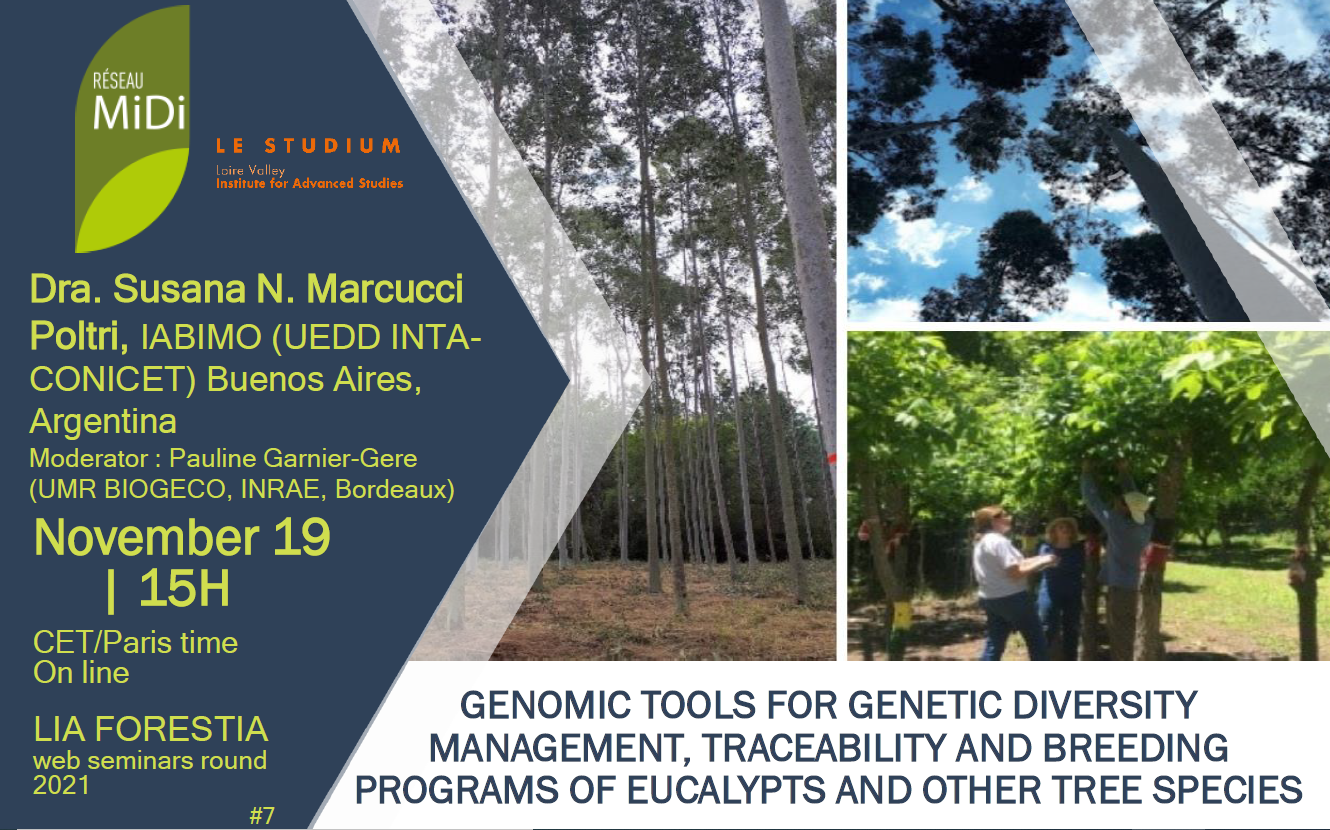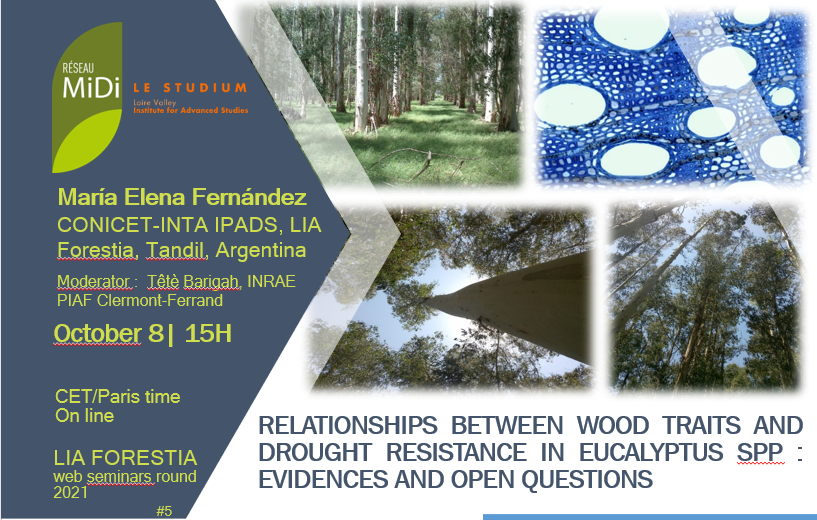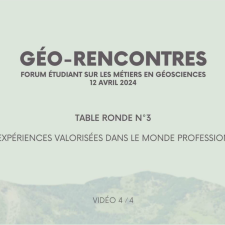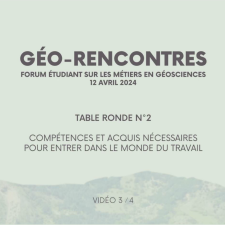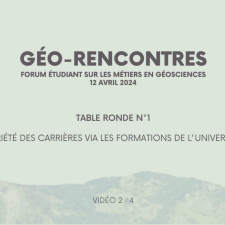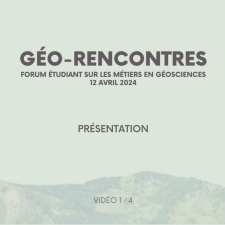Notice
#6 Eulogy of fast growth… up to what costs? A preliminary recognition before a study of trade-offs of growth heterosis in hybrid larch.
- document 1 document 2 document 3
- niveau 1 niveau 2 niveau 3
Descriptif
Round of FORESTIA web seminars
SEMINAR # 6
“Eulogy of fast growth… up to what costs?
A preliminary recognition before a study of trade-offs of growth heterosis
in hybrid larch.”
Luc E. Pâques
INRAE- UMR Biofora Orléans
October 22 at 15h (CET/Paris time)
The International Associated Laboratory FORESTIA starts in 2021 a new round of short seminars aimed at stimulating the scientific comunication among its members, as well as between them and other international laboratories. These seminars are a new opportunity for the FORESTIA scientists to present and discuss their objectives, research work and results on adaptation of forest ecosystems to global changes.
Seminar #6 by Luc E. Pâques (INRAE- UMR Biofora Orléans) ,
Abstract
Breeding and selection for growth has been a main target worldwide since breeding programmes have been initiated in the late fifties. Significant genetic gains have been achieved in most commercial forest tree species with visible impact in the development of the wood industry. Although additional traits related to stem architecture and wood traits - and in some species pests and diseases resistance- have been progressively considered, increase of productivity remains so far, a main driver of tree improvement.
However, the many threats linked to climate changes may deeply shove the ‘wood production breeding paradigm’. Indeed, several signs from forest managers and from scientists in the literature show a shift in concerns with recommendations of planting instead slow growing species to better cope with climate changes. Their belief is that fast growing species might be less tolerant for example to drought than slow growing species.
For a breeder of one of the faster growing conifers in temperate climate (Larix sp), manipulating one of the most powerful breeding strategies (interspecific hybridisation) to enhance growth (heterosis), this evolution of priorities is clearly a source of many questionings.
As a non-expert, we intend as a first step to gather relevant information on trade-offs in plants and trees in particular, which echo with an experimentation we have been conducting since 2013. This experimentation aims to better understand how hybrid vigour in Larix x eurolepis arises, which traits (structural and functional) make the hybrid different from its parents and finally what is the cost of this over-expression of vigour.
Moderator : María-Elena Gauchat (INTA-Montecarlo).
Dans la même collection
-
-
#7 Genomic tools for genetic diversity management, traceability and breeding programs of eucalypts …
Our group works on the development and application of different genomic tools to support INTA´s forest and fruit breeding programs distributed throughout Argentina.
-
#5 Relationships between wood traits and drought resistance in Eucalyptus spp: evidences and open q…
Round of FORESTIA web seminars SEMINAR # 5 “Relationships between wood traits and drought resistance in Eucalyptus spp: evidences and open questions” Dr. María Elena
-
#3 The challenge of the integrating the adaptive and technological value of wood in a changing clim…
Round of FORESTIA web seminars SEMINAR # 3 The challenge of the integrating the adaptive and technological value of wood in a changing climate Guillermina Dalla-Salda (INTA Bariloche
-
#1 Deciphering tree response to a changing climate
Round of FORESTIA web seminars SEMINAR # 1 Deciphering tree response to a changing climate Where are we? where do we go? a case study: southern beeches of Patagonia María Verónica
Sur le même thème
-
Géo-Rencontres 2024 / Les expériences valorisées dans le monde professionnel
LilloEmmaAraujoJulieHuartFlorianDubreuRomainBuquetDamienChazalLauraBorieMarianeForum sur les métiers en géosciences organisé par les étudiants du CMI Ingénierie Géologique et Civile, Université de Bordeaux, 12 avril 2024
-
Géo-Rencontres 2024 / Compétences et acquis nécessaires pour entrer dans le monde du travail
BrinonJulietteAmoleFili-FenuaPretouFrédéricCampetHugoLiébauxAlbinDe AlemeidaMarie-LouPoirierAymericDufrenoyAudreyForum sur les métiers en géosciences organisé par les étudiants du CMI Ingénierie Géologique et Civile, Université de Bordeaux, 12 avril 2024
-
Géo-Rencontres 2024 / Variété des carrières via les formations de l'université
InguimbertDianeLacazeRomaneLemaitreLaurieChazalLauraMontjeanPascalPoudevigneJacquesPortefaixFrédéricForum sur les métiers en géosciences organisé par les étudiants du CMI Ingénierie Géologique et Civile, Université de Bordeaux, 12 avril 2024
-
Géo-Rencontres 2024 / Présentation
LatasteJean-FrançoisLavieThéoForum sur les métiers en géosciences organisé par les étudiants du CMI Ingénierie Géologique et Civile, Université de Bordeaux, 12 avril 2024
-
#5 Relationships between wood traits and drought resistance in Eucalyptus spp: evidences and open q…
Round of FORESTIA web seminars SEMINAR # 5 “Relationships between wood traits and drought resistance in Eucalyptus spp: evidences and open questions” Dr. María Elena
-
#7 Genomic tools for genetic diversity management, traceability and breeding programs of eucalypts …
Our group works on the development and application of different genomic tools to support INTA´s forest and fruit breeding programs distributed throughout Argentina.
-
-
#3 The challenge of the integrating the adaptive and technological value of wood in a changing clim…
Round of FORESTIA web seminars SEMINAR # 3 The challenge of the integrating the adaptive and technological value of wood in a changing climate Guillermina Dalla-Salda (INTA Bariloche
-
S2-Dynamics of hydrometeorological extremes in Southern Germany and the Alps
Dynamics of hydrometeorological extremes in Southern Germany and the Alps Ralf Ludwig (Co-Chair, of the Collaborative programmes of ECRA on Hydological Cycle; LMU, Germany)
-
S1- Opening of the symposium : The state of global climate change
Opening of the symposium : The state of global climate change Hervé Le Treut (Dir. IPSL, Paris)
-
Session 3 - Forest and wine growing face to drought : INTRODUCTION
Session 3 - Forest and wine growing face to drought : INTRODUCTION
-
S2- Introduction to ECRA
Introduction to ECRA Winfried Hoke, ECRA Secretariat



